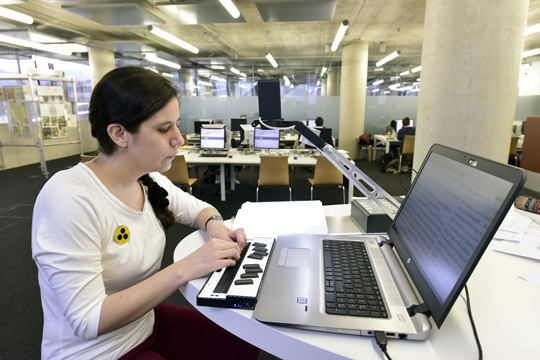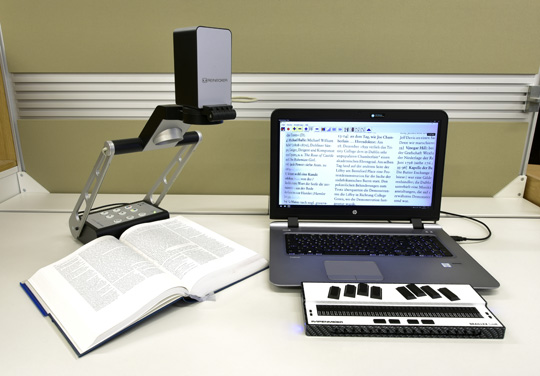On-the-go support
Freiburg, Apr 05, 2017
About 14 percent of the student body at the University of Freiburg has a disability or chronic disease. Yisita Hernández is one of them: the law student was born with only four percent of her overall vision. It requires a very good memory and technical devices to support her ability to learn.
 Learning with the help of a camera system and Braille display: Yisita Hernández takes pictures of the texts, enlarges them on her laptop or translates them into Braille via a small rectangular box. Photo: Thomas Kunz
Learning with the help of a camera system and Braille display: Yisita Hernández takes pictures of the texts, enlarges them on her laptop or translates them into Braille via a small rectangular box. Photo: Thomas Kunz
A whirring sound and the camera has already captured the text. „Vagrants and daylabourers are you called: the world trembles at our name." The computerized voice creakily stumbles over the syllables of James Joyce's novel „Ulysses". Yisita Hernández pushes the book up a tad. The next paragraph is displayed on the laptop monitor. On the surface of the rectangular box that stands before the computer, little white dots appear.

Camera system (back left), a laptop with specialized software and Braille display makes learning easier for visually impaired students. Photo: Thomas Kunz
Hernández runs her fingertips across the pattern they have created. She can't read Braille; she is just demonstrating how her fellow students do it. Every single day Hernández uses the camera system and laptop with its specialized software that enlarges and reads texts aloud: also when she studies at the library, when she takes exams or when she writes notes from the blackboard.
Flexible learning with a trolley
Hernández studies law and was born with only four percent of her overall vision. She can recognize colors very well – tiny details and moveable objects, on the other hand, give her a great deal of trouble. The camera system that is sitting atop her desk right now looks a lot like a desktop lamp.
She can use it not only to take pictures of books, but also of scripts and even blackboard images that she can then directly transfer to her laptop. She loaned the device from the University. Just like the Braille display that turns texts into Braille, she is able to take her devices with her in a handy trolley wherever she goes.
Beate Massell, Special Needs Officer for Students with Disabilities and Chronic Illnesses at the University of Freiburg, selected the devices together with a team of future users and now lends them to students – a service that is meant to offer more flexibility to those affected by a disability or chronic illness. Everyone is eligible to loan a device, including guest students who are doing a semester abroad or are attending a block seminar.
„Last year someone came from Berlin to take an exam. He had a stationary device at home that could enlarge texts for him, but it weight 20 kilograms. I had to quickly arrange for a similar reading device and laptop and carry it into the examination room. I had sore muscles for a while after that," explains Massell.
Similar situations would have arisen more often during the exam period, which is why the idea was born to get University-based devices that were new or gently used and that were light and easy to transport. A wireless audio transmission device is one of them. It softens ambient sound and increases the volume of voices so hearing impaired students, those with attention deficit disorders or autism spectrum disorders can follow along in class better.
A bit of detective work
At the moment, Hernández is loaning devices much more frequently as she enters the final testing period of her second state exam. A student who is visually impaired – that requires a certain level of detective work and memory training. She points to a printer sitting on a wall shelf. „I can see a large grey box. When I am in a computer room at the University, I know it is a printer. But if I am in a supermarket, I also know that the grey box can't possibly be a printer."
Hernández needs a legal reference book from the reading room. She sets off. First aisle: labor law, second aisle: corporate and commercial law, third aisle: Constitutional and administrative law. Step by step she works her way through the stacks until she finally finds what she came for: in the last shelf in the aisle, top right is the very book she needs.
A huge relief
„I have memorized my various paths. I note which aisle has which books that I need. At the beginning of college, I thought I would never find my way around the library – too many rooms and signs." Mobility training would have helped her navigate her way more freely through the stacks and on campus. The Association for the Blind and Visually Impaired in South Baden provides such tours at the University of Freiburg.
The student has found her way back to her seat, legal reference book in hand. The camera whirrs quietly once again. Instead of Joyce's masterpiece, a page filled with paragraphs is beneath the lens. „I don't know how visually impaired people studied twenty years ago. Today's technical assistance is a huge relief. I couldn't attend college if it weren't for them."
Sonja Seidel
Information about all available devices and how to loan from the pool of helpful learning aids

